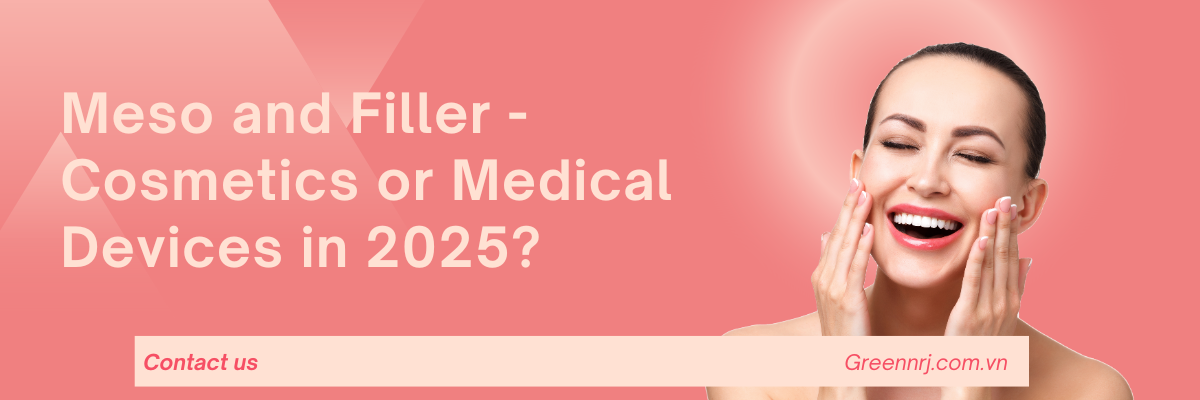- If you have any questions, please contact us!
- +84 965 624 065
- info@greennrj.com.vn
Meso and Filler – Cosmetics or Medical Devices in 2025? Critical Update

Can a Medical Device Registration Number be Authorized for Import in Vietnam 2025 – Successful Compliance
August 25, 2025
Penalty for Importing Cosmetics Without Notification Certificate: Complete Guide 2025
August 28, 2025In recent months, many companies in Vietnam have faced unexpected recalls of their cosmetic dossiers for mesotherapy (meso) products. This sudden shift has left importers, distributors, and doctors wondering: are meso and filler actually cosmetics, or should they be classified as medical devices? The answer to this question determines whether your products can continue to be sold legally in 2025, or if they require an entirely new registration process. In this article, Green NRJ explores the regulatory confusion, the risks of misclassification, and the path to compliance.
Why Meso & Filler Are Not Cosmetics Under ASEAN Rules
Under ASEAN cosmetic regulations, cosmetics are defined strictly as products applied to the surface of the skin, hair, or nails, without penetrating deeper layers. Meso and filler, however, are:
-
Injected or delivered below the skin barrier – which immediately excludes them from the definition of cosmetics.
-
Formulated with active substances intended to act directly in the dermis or subcutaneous tissue.
-
Used invasively, often through microneedling or injection, going far beyond surface-level application.
👉 For these reasons, both meso and filler products cannot be classified as cosmetics under ASEAN rules.
Correct Classification: Filler Cosmetic or Medical Device?
When we look at their method of administration and intended use, meso and filler are classified as medical devices in Vietnam. Specifically:
-
Dermal fillers fall under Class D medical devices because of their high risk level and invasive application.
-
Meso products are also treated as medical devices if they require injection or delivery beneath the skin surface.
-
This classification requires a different regulatory route compared to cosmetic notification.
Class D Medical Device Registration in Vietnam
Before any import, Class D medical devices such as dermal fillers must first obtain a valid Marketing Authorization (MA) issued by the Ministry of Health (MOH) via the DMEC portal. This MA process is stricter than cosmetic notification, as it requires detailed technical documentation, clinical evidence of safety, and quality certifications. Only after securing the MA can companies legally import and distribute fillers in Vietnam, ensuring both compliance and patient safety.
Risks of Misclassifying Meso in 2025
Businesses that continue treating meso or filler as cosmetics risk serious consequences:
-
Product recalls – dossiers already approved have been withdrawn by authorities.
-
Import delays – shipments may be blocked at customs if classification is incorrect.
-
Regulatory penalties – fines or suspension of business licenses for non-compliance.
-
Reputational damage – distributors and clinics lose trust when products face sudden recalls.
Correct classification is therefore not optional—it is essential for business continuity.
How Green NRJ Helps With Medical Device Registration
Green NRJ supports companies in navigating these changes with tailored solutions:
-
Reviewing existing cosmetic notifications and identifying which products must be reclassified.
-
Advising whether a product qualifies as a cosmetic or must be registered as a medical device.
-
Preparing and submitting Class D medical device dossiers in Vietnam.
-
Offering compliance strategies to minimize risks and protect business operations.
With Green NRJ, you gain a reliable partner who ensures your meso and filler products are legally registered and market-ready.
Final Thoughts
So, is filler a cosmetic or medical device? In Vietnam, the answer is clear: both meso and filler must be classified and registered as medical devices, not cosmetics. Companies that fail to adapt face costly recalls, delays, and compliance risks.
👉 Contact Green NRJ today to reclassify and register your meso and filler products—so your business stays compliant, avoids disruption, and continues to grow with confidence.


